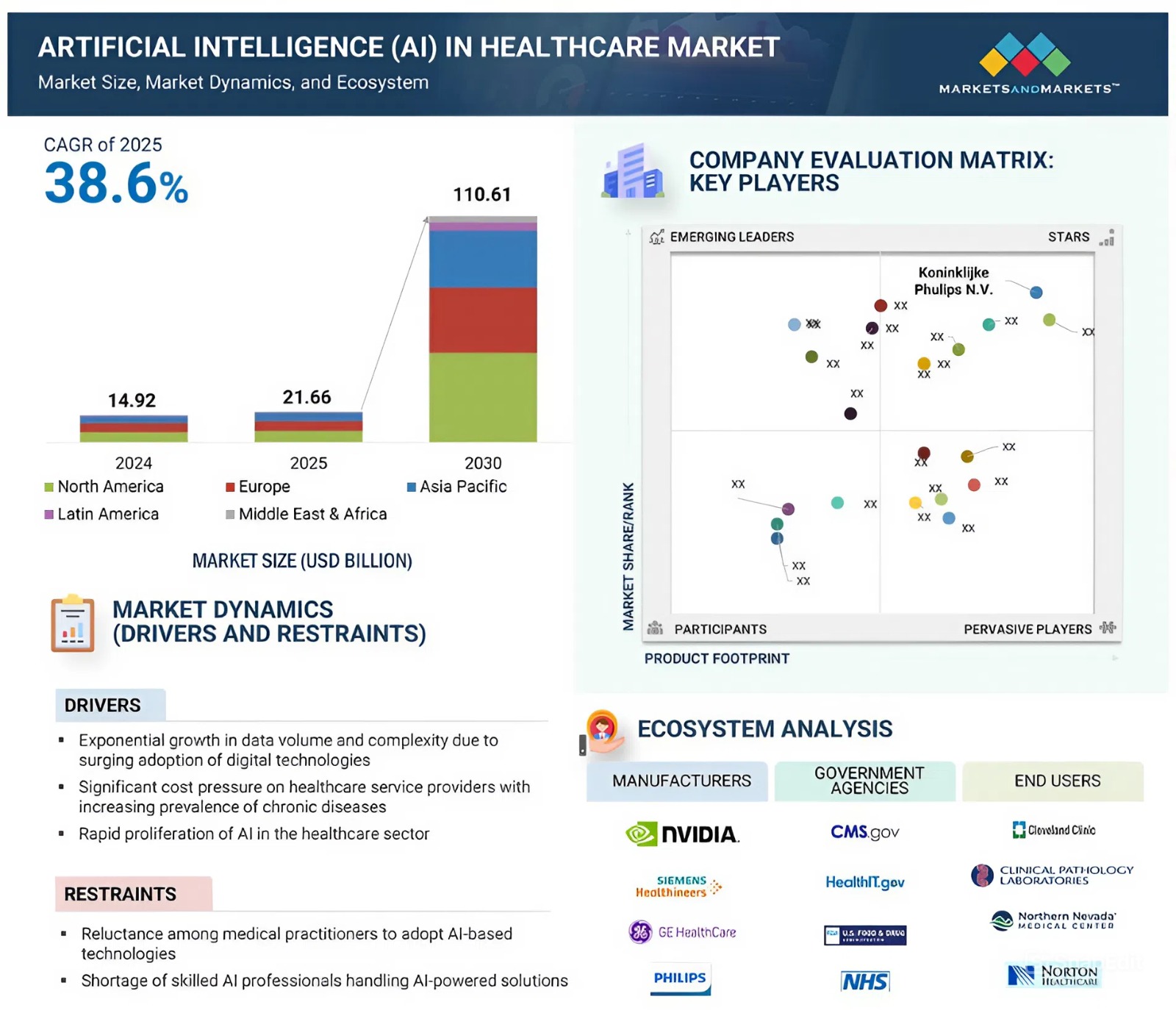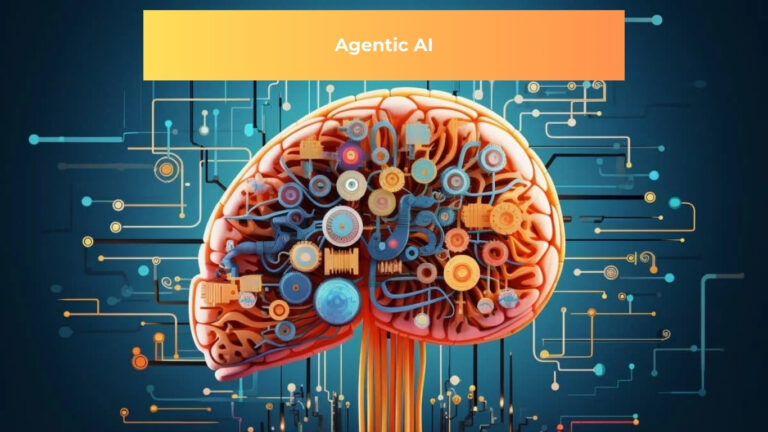By 2030, the global AI healthcare market is projected to reach $110.61B, with Agentic Reasoning AI Doctor systems leading the charge. These autonomous systems mimic clinical reasoning, addressing critical healthcare challenges like diagnostic errors and staff shortages.
From agentic AI in healthcare to personalized patient diagnostics, Agentic Reasoning AI Doctors empower providers to deliver faster, more accurate care globally.
Discover how this technology transforms healthcare and why HBLAB is your trusted partner for agentic AI for healthcare.
What is an Agentic Reasoning AI Doctor?
An Agentic Reasoning AI Doctor is a cutting-edge AI system designed to act like a human doctor, making independent decisions to diagnose, treat, and manage patient care.

Unlike typical AI tools that follow strict rules or simply analyze data, these systems think proactively. They process vast amounts of patient information—such as medical records, lab results, and imaging scans—to make smart, goal-driven choices, like suggesting tests, crafting treatment plans, or prioritizing urgent cases.
For example, if a patient shows symptoms of a heart condition, an Agentic Reasoning AI Doctor doesn’t just flag the issue. It evaluates the patient’s history, considers possible diagnoses, recommends an ECG, and adjusts its plan if new data comes in.
This autonomy makes it a game-changer for hospitals and clinics, enhancing agentic AI in healthcare by streamlining workflows and improving patient outcomes.
With agentic AI for healthcare providers, these systems integrate seamlessly into existing systems, reducing clinician workload while ensuring accurate, timely care.
HBLAB has an in-depth study on the importance of Agentic AI — Read more now
How Agentic Reasoning AI Doctors Work: Key Building Blocks
Below, we break down the key components of Agentic Reasoning AI Doctors
1. Smart Data Collection (Sensors)
Just as human doctors rely on their senses to gather information, Agentic Reasoning AI Doctors use digital “sensors” to collect data from the healthcare environment. These sensors pull in information from electronic health records (EHRs), medical imaging (like X-rays or MRIs), lab results, and even wearables like smartwatches.
For example, an AI might analyze a patient’s heart rate data from a wearable to detect early signs of a condition.
This ability to gather and process diverse data ensures personalized patient diagnostics, giving providers a complete picture of a patient’s health.
2. Action-Oriented Tools (Actuators)
Once an Agentic Reasoning AI Doctor processes data, it uses “actuators” to take action, much like a doctor prescribing medication or scheduling a test.
These actions might include updating EHRs, scheduling appointments, sending alerts to clinicians, or recommending treatments. For instance, an AI could automatically schedule a follow-up for a patient with abnormal lab results, streamlining workflows.
These actuators enable AI medical automation, reducing manual tasks and saving time for healthcare staff.
3. Intelligent Decision-Making (Brain)
The “brain” of an Agentic Reasoning AI Doctor is where the magic happens. This component includes processors, control systems, and decision-making mechanisms that analyze data and make smart choices.

Unlike traditional AI, which follows fixed rules, agentic reasoning allows the AI to think like a clinician—evaluating options, weighing risks, and planning steps. For example, it might analyze a patient’s symptoms, consider multiple diagnoses, and recommend a CT scan for the most likely condition.
This intelligent decision-making powers AI-driven clinical support, enabling faster, more accurate care.
4. Adaptive Learning and Knowledge Storage
Agentic Reasoning AI Doctors don’t just follow instructions—they learn and improve over time. Their “memory” is a knowledge base that stores medical data, such as treatment guidelines, past patient outcomes, and the latest research.
Learning systems allow the AI to spot patterns, adapt to new information, and refine its decisions. For instance, if new research shows a better treatment for diabetes, the AI updates its approach to reflect this.
This continuous learning ensures agentic AI for healthcare providers stays current, delivering cutting-edge care.
Why Agentic Reasoning AI Doctors Are Game-Changers for Healthcare
Boosting Diagnostic Precision
Agentic Reasoning AI Doctors shine in spotting health issues with unmatched accuracy. They quickly process vast amounts of data—think medical records, lab results, and imaging scans—to identify conditions like heart disease, cancer, or rare disorders. By using AI-driven clinical support, these systems reduce diagnostic errors significantly, catching subtle signs that might slip past human eyes.

This precision comes from agentic reasoning, which lets the AI evaluate multiple possibilities and prioritize the best tests.
Crafting Personalized Treatment Plans
With Agentic Reasoning AI Doctors, every patient gets care tailored just for them. These systems analyze a patient’s genetics, lifestyle, and medical history to create personalized patient diagnostics and treatment plans that are more effective and less invasive.
For example, a patient with high blood pressure might receive a customized medication and diet plan based on their unique profile, leading to better health outcomes.
Thanks to agentic AI for healthcare providers, these plans adapt as new information comes in, keeping care relevant.
This personalized approach reduces hospital readmissions and boosts patient satisfaction, saving providers time and resources.
Preventing Health Issues Early
Agentic Reasoning AI Doctors don’t just treat problems—they stop them before they grow. Using agentic AI healthcare trends like predictive analytics, they analyze data from wearables, medical records, and other sources to spot early signs of conditions like diabetes or heart failure.
This early intervention cuts emergency visits and long-term costs, helping providers manage high-risk patients efficiently.
Streamlining Hospital Operations
Administrative tasks like scheduling appointments or updating electronic health records (EHRs) can overwhelm healthcare staff. Agentic Reasoning AI Doctors tackle these chores with AI medical automation, freeing clinicians to focus on patients.
For example, an AI can automatically prioritize urgent cases, update records, and handle billing, reducing wait times and staff burnout.
This efficiency saves up operational costs and allows hospitals to handle more patients with fewer resources. It’s a scalable solution that makes implementing agentic AI in healthcare a smart choice for busy providers.
Providing Round-the-Clock Care
Unlike human doctors, Agentic Reasoning AI Doctors are available 24/7, offering instant support to patients and providers. This is a lifeline for remote or underserved areas with limited access to healthcare.
This constant availability enhances agentic AI healthcare, making care more accessible and equitable.
Overcoming Hurdles in Adopting Agentic Reasoning AI Doctors
Agentic Reasoning AI Doctors hold immense promise for transforming healthcare, delivering AI-driven clinical support and personalized patient diagnostics that enhance patient care and streamline operations. However, rolling out these advanced systems comes with challenges that healthcare providers must navigate to ensure safe and effective adoption.
Below, we explore the key hurdles and how HBLAB’s solutions ensure secure, compliant agentic AI for healthcare providers.
1. Safeguarding Patient Data Privacy
Protecting sensitive patient information is a top priority when using Agentic Reasoning AI Doctors. These systems process vast amounts of data, including electronic health records (EHRs), lab results, and wearables, to deliver personalized patient diagnostics.

However, strict regulations like GDPR and HIPAA demand robust security measures to prevent data breaches. A single leak could compromise patient trust and lead to legal penalties.
To address this, agentic AI in healthcare must use advanced encryption and secure data storage. For example, an AI system analyzing patient records needs enterprise-grade safeguards to ensure compliance.
👉 HBLAB’s CMMI Level 3 certification guarantees that its agentic AI healthcare solutions meet these standards, protecting data while enabling seamless integration with hospital systems.
2. Addressing Ethical Concerns and Bias
Agentic Reasoning AI Doctors rely on vast datasets to make decisions, but if those datasets are biased, the AI could misdiagnose certain groups, such as underrepresented populations.
For instance, an AI trained on data primarily from one demographic might overlook symptoms of a condition in another, leading to unfair or inaccurate care. Ethical concerns also arise around transparency—patients need to know when AI, not a human, is guiding their treatment.
To mitigate bias, agentic AI for healthcare providers must be trained on diverse, inclusive datasets and regularly audited for fairness.
3. Navigating Regulatory Compliance
The rise of agentic AI healthcare trends has brought increased scrutiny from regulators worldwide. Agentic Reasoning AI Doctors must comply with strict healthcare standards to ensure patient safety and system reliability. For example, agencies like the FDA or EU regulators require rigorous testing to validate AI decisions, especially for high-stakes tasks like diagnostics or treatment planning.
Non-compliance could delay adoption or lead to costly penalties.
4. Ensuring System Integration and Interoperability
Agentic Reasoning AI Doctors need to work seamlessly with existing healthcare systems, such as EHR platforms or hospital management software.
Unlike traditional AI, which operates in isolated environments, agentic AI for healthcare providers requires integration with APIs, databases, and external tools to deliver AI medical automation. A lack of interoperability can disrupt workflows, causing delays or errors.
For example, an AI recommending tests must sync with a hospital’s scheduling system to avoid bottlenecks.
5. Managing Complexity and User Trust
The advanced capabilities of Agentic Reasoning AI Doctors, such as autonomous decision-making and multi-step workflows—make them more complex than traditional AI.
This complexity can lead to skepticism among clinicians and patients who may question the AI’s reliability compared to human judgment.
For instance, a doctor might hesitate to trust an AI’s treatment plan without clear explanations.
To build trust, agentic AI healthcare systems must provide transparent, explainable decisions.
Comparison: Agentic Reasoning AI Doctors vs. Traditional AI
| Feature | Agentic Reasoning AI Doctor | Traditional AI |
| Functionality | Autonomous, goal-driven | Rule-based, reactive |
| Decision-Making | Plans and executes tasks independently | Provides suggestions for human action |
| Use Case | Agentic AI for healthcare providers creating treatment plans | Detecting anomalies in scans |
| Adaptability | Learns from new data and updates knowledge | Relies on static algorithms |
| Integration | Connects with APIs, EHRs, and external tools | Operates in closed systems |
| Error Handling | Self-corrects and finds alternative solutions | Limited error recognition |
Agentic Reasoning AI Doctors outperform traditional AI by acting as proactive clinicians, enhancing agentic AI healthcare efficiency and adaptability. Their ability to integrate with systems and self-correct makes them ideal for complex healthcare environments.
Best Scenarios for Using Agentic Reasoning AI Doctors
Agentic Reasoning AI Doctors shine in situations where healthcare providers need smart, independent systems to make data-driven decisions quickly and accurately.
Unlike traditional AI tools that rely on human input, these advanced systems act like virtual clinicians, analyzing data, planning actions, and adapting to new information.
Below, we explore the top scenarios where Agentic Reasoning AI Doctors make a big impact.
1. Managing Chronic Diseases
Agentic Reasoning AI Doctors are perfect for handling long-term conditions like diabetes, heart disease, or asthma.
These systems continuously monitor patient data from wearables, lab results, and electronic health records (EHRs) to provide personalized patient diagnostics.

For example, an AI can track a diabetic patient’s blood sugar levels, adjust insulin doses, and suggest diet changes in real-time, preventing complications.
This proactive approach reduces hospital visits and improves patient outcomes. By delivering AI-driven clinical support, these systems help providers manage high-risk patients efficiently, saving time and resources.
2. Streamlining Administrative Tasks
Hospitals and clinics often struggle with time-consuming tasks like scheduling appointments, updating records, or managing billing. Agentic Reasoning AI Doctors excel at AI medical automation, handling these chores automatically to free up staff for patient care.
For instance, an AI can prioritize urgent appointments based on symptoms or update EHRs without manual input, cutting wait times and reducing staff burnout.
3. Accelerating Drug Discovery
Developing new medications is a slow and costly process, but Agentic Reasoning AI Doctors speed it up by analyzing vast datasets, such as clinical trial results and genetic information. These systems use agentic AI in healthcare to identify promising drug compounds, predict their effectiveness, and streamline research timelines. For example, an AI might analyze genetic data to find a new treatment for rare cancers, cutting months off development time.
This capability is vital for pharmaceutical companies and research institutions aiming to innovate quickly.
4. Supporting Remote and Underserved Areas
In regions with limited access to doctors, Agentic Reasoning AI Doctors provide 24/7 care, making healthcare more accessible. These systems can analyze symptoms, recommend treatments, or guide patients to the nearest clinic, all through telehealth platforms. For example, a rural patient with chest pain can consult an AI for immediate advice, ensuring timely care without long-distance travel.
This accessibility aligns with agentic AI healthcare trends, promoting equitable care globally.
👉 HBLAB’s flexible engagement models ensure tailored agentic AI for healthcare solutions.
HBLAB: Your Partner in Agentic Reasoning AI Doctor Solutions
HBLAB is a global leader in agentic AI for healthcare, delivering innovative solutions that empower healthcare providers. With AI expertise since 2017, our 630+ professionals, including 30% senior-level experts, develop secure, scalable Agentic Reasoning AI Doctor systems. Our CMMI Level 3 certification ensures compliance, while our partnership with VNU’s Institute for AI drives cutting-edge innovation.
Offering up to 30% cost savings through flexible engagement models: offshore, onsite, and dedicated teams, HBLAB helps providers implement agentic AI in healthcare efficiently.
🌟 Transform healthcare with Agentic Reasoning AI Doctors.
CONTACT US FOR A FREE CONSULTATION!
Read more:
– Healthcare Software Development: 7 Powerful Trends Reshaping Global Care
– Healthcare App Development: Revolutionizing Patient Care and Medical Practices
– Agentic AI In-Depth Report 2025: The Most Comprehensive Business Blueprint





